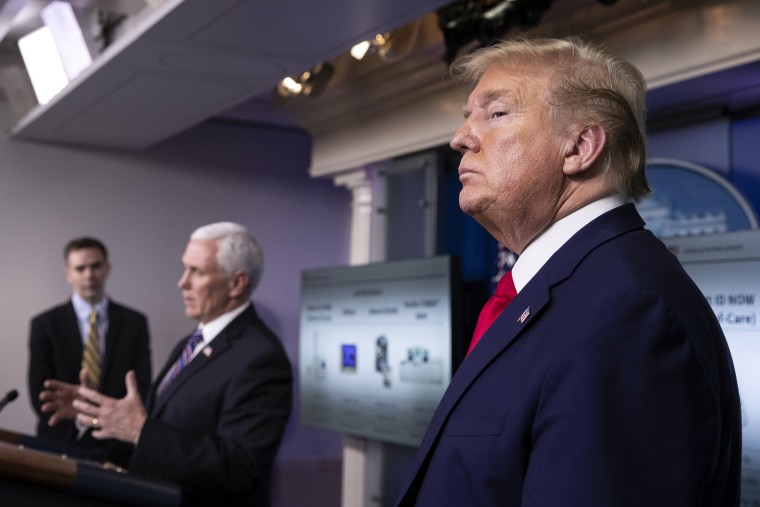"The people of our country should think of themselves as warriors," Donald Trump told reporters yesterday. "Our country has to open." It was a line the president repeated several times yesterday, suggesting he was fond of the phrasing.
At a Honeywell production facility in Arizona, Trump said, "The people of our country are warriors." At a roundtable event with Native Americans, he added, "The people of our country are warriors.... I'm not saying anything is perfect. And, yes, will some people be affected? Yes. Will some people be affected badly? Yes. But we have to get our country open."
The irony of all this "warrior" talk is that the president isn't eager to fight; he's eager to walk away from the fight.
President Donald Trump's coronavirus task force is in the early stages of winding down, according to two people familiar with the matter. The meetings in the Situation Room of the White House have been shorter, and the task force no longer meets every day, according to the two people. Drs. Deborah Birx and Anthony Fauci are still expected to be at the White House daily, but other members of the task force may be present less frequently.
As the NBC News report went on to note, Trump confirmed that the White House coronavirus task force is disbanding, with he and his team "now looking at a little bit of a different form." Vice President Mike Pence, who's responsible for leading the panel, said the centralized federal response -- to the extent that there is a centralized federal response -- will shift responsibilities in the coming weeks to relevant agencies.
It's part of a series of related decisions that collectively tell a striking story. Trump has already scrapped the White House coronavirus guidelines, which included standards that had served as a foundation of the federal response to the pandemic. Those guidelines were replaced with a new multi-phase directive, laying out a series of benchmarks the administration wants states to meet when weighing how best to reopen, which the president has also largely rejected.
And now, even as the death toll grows and the infection rate remains stubbornly high, Trump has decided he doesn't see the need for the White House coronavirus task force, either.
It's not that the president believes the problem has already been solved. In fact, the opposite is true: Trump acknowledged yesterday that "there'll be more death" from the pandemic.
But the Republican nevertheless believes it's time to start tolerating the effects of the crisis. "There'll be more death," but that's a price Trump is willing to let others pay. "Some people" will be "affected badly," but the president is comfortable letting them take one for the team.
Circling back to a historical observation from a couple of months ago, in 1966, with the Vietnam War dragging on, then-Sen. George Aiken was asked for his opinion about the future of U.S. policy in the region. The Vermont Republican gave a relatively long, thoughtful answer about how the United States "could well declare unilaterally ... that we have 'won' in the sense that our armed forces are in control of most of the field and no potential enemy is in a position to establish its authority over South Vietnam."
The front-page headline in the New York Times read the next day, "Aiken Suggests U.S. Say It Has Won the War." In time, the public's understanding of the senator's position evolved into a convenient catchphrase -- "Declare victory and go home" -- which Aiken never actually said.
More than a half-century later, Trump appears eager to embrace a related posture toward COVID-19. There's still an enormous amount of work to do, but the president appears eager, not to declare victory and go home, but to declare victory and encourage others to leave their homes.

